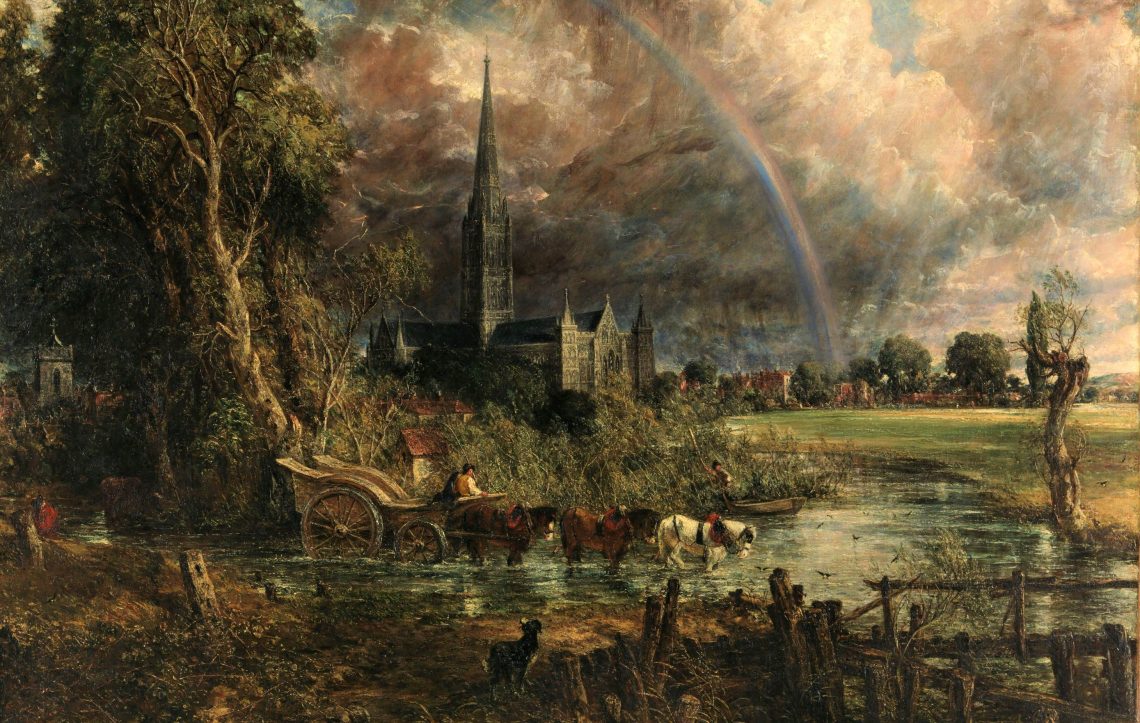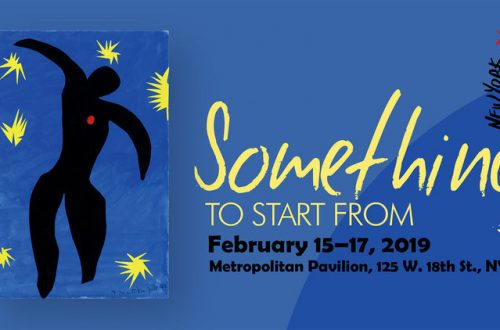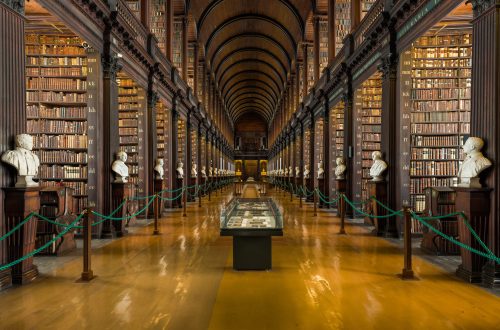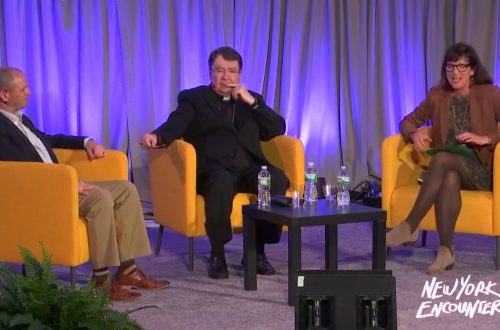by David P. Deavel
This article is reprinted with generous permission from The Genealogies of Modernity Project. is an initiative that explores the structure of modernity, the various ways modernity arose, and how to think about other possible modernities. The site features articles from a wide variety of disciplines and perspectives. The Project also includes summer graduate seminars and a podcast. It is sponsored by the Beatrice Institute and the Collegium Institute. You can follow the project on Twitter, Instagram, and Facebook. The organizers express their excitement to share this article on Newman and modernity with Veritas Journal. (The original publication can be found online here.
I have been writing and teaching about John Henry Newman for almost two decades now. While Newman’s genius is evident to many of my students, many of those most receptive to this now-canonized hero of Catholic orthodoxy are quite shocked by his description of the “illative sense” in his 1870 work An Essay in Aid of a Grammar of Assent. The illative sense, which he calls “a grand word for a common thing,” is that faculty of judgment of the human being that renders the “sole and final judgment on the validity of an inference in concrete matter.” While Newman is clear that “reason never bids us be certain except on an absolute proof,” my students read on and find out that not only can “such a proof never be furnished to us by the logic of words” but that “[e]very one who reasons, is his own centre; and no expedient for attaining a common measure of minds can reverse this truth. . . .”
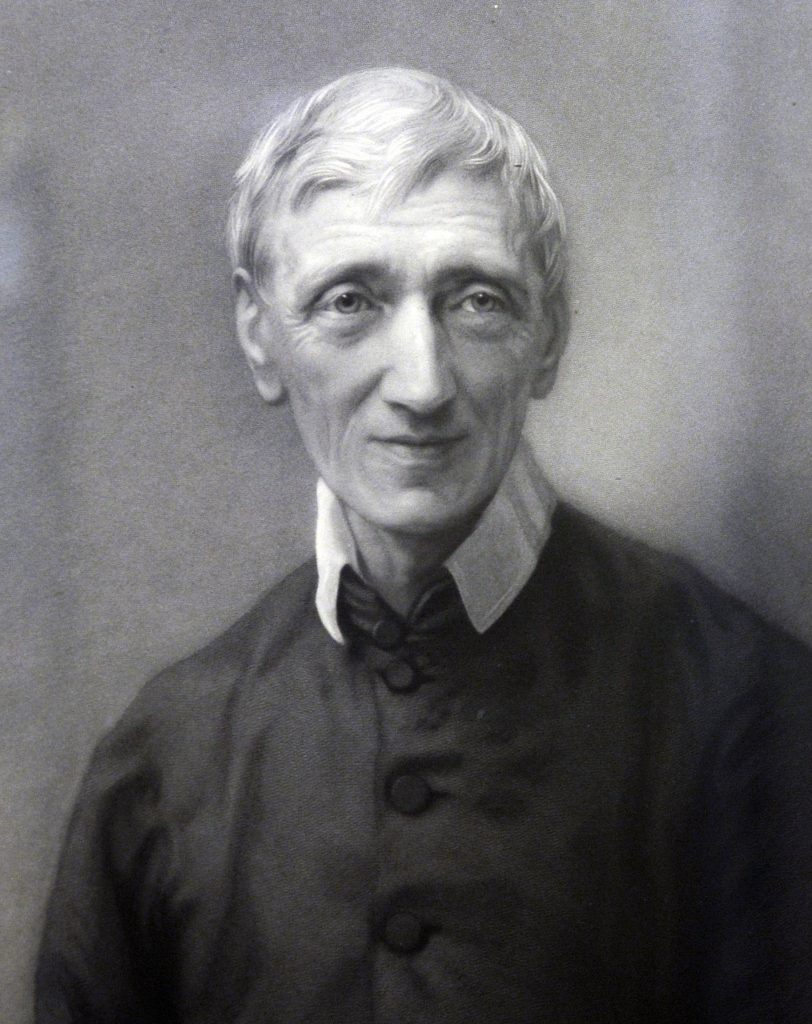
Absolute proof and certainty are appealing to my Christian students in an age in which too many professors, pundits, and experts are peddling a line of relativism. Though it is generally a selective relativism in which one’s opponents’ convictions are deemed relative and one’s own are assumed to be beyond dispute, most secular proselytizers of relativism do not seem to have detected their own assumed first principles. Though my students can see that critics of Christian belief are thus “cheating,” what bothers them are Newman’s lines about the self-sufficiency of the person. Inevitably, a fair number will, on first reading, be horrified to wonder if Newman is himself a relativist.
Their horror, which we have to sort out in the course of the class, comes from the assumption of the notions of an earlier form of “modern” thought that assumes that we can all speak together and philosophize on the basis of a universal reason to which all people must agree. This can be seen both in self-professed Christians such as Locke, who sometimes argued in a way that seemed (it is not clear that this is his position) to indicate Christian belief had to be proven in the court of secular reason in his The Reasonableness of Christianity (1695), but also in the explicitly atheist philosophers such as D’Holbach who reduced all action to a naturalistic movement of atoms. The genius of Newman was to see not only that the attempts by philosophers to reduce the power of reason to a set of explicit logical maneuvers was itself a false understanding, but also. that those propounding such ideas generally had silently imported a number of first principles that were atheistic in principle, philosophical materialism being the most important one.
Newman said that the claim that reason itself was reducible to a set of logical principles that would bind every human being was a theoretical construct. If this claim for a largely mechanistic form of reasoning was followed conscientiously, Newman thought, then the vast majority of thinking and decision-making engaged in by ordinary human beings would be non-rational at best and irrational at worst. Even philosophers would, if they were honest, discover that their own way of life fell far short of the pattern of rationality that they were attempting to sell as the only one. Far better for a true philosopher to admit that our ordinary way of thinking is not only rational, but actually more rational because more complete.
The ordinary way of thinking, in which we all believe that we can come to a great many certainties, is that we make judgments not by doing complex explicit logical analysis that can be represented by words or even statistical levels of certainty. Instead, we think in ways that are intensely individual, an insight that Newman had gained much earlier in his career. In his 1840 sermon “Implicit and Explicit Reason,” Newman compared the ordinary human thinker to one making an ascent by foot:
One fact may suffice for a whole theory; one principle may create and sustain a system; one minute token is a clue to a large discovery. The mind ranges to and fro, and spreads out, and advances forward with a quickness which has become a proverb, and a subtlety and versatility which baffle investigation. It passes on from point to point, gaining one by some indication; another on a probability; then availing itself of an association; then falling back on some received law; next seizing on testimony; then committing itself to some popular impression, or some inward instinct, or some obscure memory; and thus it makes progress not unlike a clamberer on a steep cliff, who, by quick eye, prompt hand, and firm foot, ascends how he knows not himself; by personal endowments and by practice, rather than by rule, leaving no track behind him, and unable to teach another. It is not too much to say that the stepping by which great geniuses scale the mountains of truth is as unsafe and precarious to men in general, as the ascent of a skilful mountaineer up a literal crag. It is a way which they alone can take; and its justification lies in their success. And such mainly is the way in which all men, gifted or not gifted, commonly reason,—not by rule, but by an inward faculty.
Most big-picture questions have many, many aspects that cannot be easily condensed and placed in the kind of order that is demanded by the logicians of early modernity. But more importantly, those many aspects involve countless judgments about the premises involved in any rational procedure. Our first principles are all assumed and not argued to. The secondary premises involve judgments about countless probabilities not subject to strict proof. We make our judgments about all big questions on the basis of assumptions and our judgments about an accumulation of evidence, much of which is not easily reduced to syllogistic form. Even for the evidence that we can explicitly write out, we often do not do it because it either takes too long (“Life is not long enough,” he wrote in his Tamworth Reading Room letters, “for a religion of inferences”) or the reductions end up being too unrepresentative of the complex ways in which we really think and decide. This can be uncomfortable for the formal logician, but Newman is comfortable with the fact that “inference,” the term by which he designates the logical actions of our minds in moving from antecedents to consequents, from premises to conclusions, “is necessarily obscure.”
It is significant that Newman’s image in the passage is different than the one used by many philosophers who tend to label cumulative arguments they disapprove of as “leaky buckets” arguments. These philosophers say that our complex arguments, composed of many probabilities, are like the man who cannot hold all the water in one bucket because they all have leaks in them, and thus arranges them in such a way that one bucket catches the leaks of another. The difficulty, say the philosophers, is that when all the buckets are leaky, the water will eventually fall out.
The assumption in such an image is that arguments must be like buckets that contain the truth. For Newman, human reason is not the trapping of truth in a bucket but a journey to truth that is taken with varying kinds of intellectual equipment. One might fall on the way or get there by a more circuitous or “obscure” route, but the question is whether one gets there. In a variation on the image of the mountain climber, Newman compared in a letter the one attempting to gain certitude on a big question to a person trying to cross a chasm. One might have three different ropes, none of which alone can hold one’s weight. Put together, however, they do allow passage.

Thus, for Newman “certitude,” the “perception of a truth with the perception that it is a truth, or the consciousness of knowing,” is possible for big questions even if one’s intellectual tools are not the greatest. That is because he has passed by the early modern assumption that we can somehow comprehend truth in any kind of universally-applied logical bucket (his own preferred term for what we do is “apprehend”), but he has also avoided the late-modern (think of Kant’s claim that we really don’t have access to the noumenal world but only the phenomenal) or postmodern assumption that we cannot really have access to truth with a capital T at all. Not every climber chooses a successful route, but this fact is not evidence that other climbers on other routes cannot conquer the ascent.
In other words, our reasoning might be user-relative, but truth is not itself relative. Our path to truth is only as subjects who seek it out from particular perspectives, but we must reject what C. S. Lewis later called “the poison of subjectivism” which posits that there are only perspectives and no full picture to which those perspectives attach.
Most of my students come around to agreeing with Newman that though the fact that “there is no ultimate test of truth besides the testimony born to truth by the mind itself” can be “perplexing,” nevertheless it is also a “normal and inevitable characteristic of the mental constitution of a being like man on a stage such as the world.” They come to agree with him in part because of one of his own first premises about the status of human beings as created beings: namely, that “the laws of the mind are the expression, not of mere constituted order, but of His will.” If God’s will is that we really see through a glass, he will help us despite its dark quality.
Newman scholar Edward Sillem once observed that John Henry Newman “stands at the threshold of the new age as a Christian Socrates, the pioneer of a new philosophy of the individual person and personalist life.” In his assent to our ability to find truth starting from our own limited perceptions of reality, he steps beyond the modern-day sophistry of certain post-moderns, but also beyond the world of an Enlightenment-mentality that not only assumes some false premises but dictates the use of a narrow and mechanical form of reasoning.
David P. Deavel is editor of Logos: A Journal of Catholic Thought and Culture and visiting assistant professor of Catholic Studies at the University of St. Thomas (MN). His book, Solzhenitsyn and American Culture: The Russian Soul in the West, co-edited with Jessica Hooten Wilson, will be published in October from University of Notre Dame Press.
Want to read more? Consider following up with one of the works by John Henry Newman mentioned in the article:
“Implicit and Explicit Reason,” 1840 (Sermon)
An Essay in Aid of a Grammar of Assent, 1874 (Book Length Work)
Header Image: John Constable, “Salisbury Cathedral from the Meadows,” 1831 (detail) (Public Domain)
